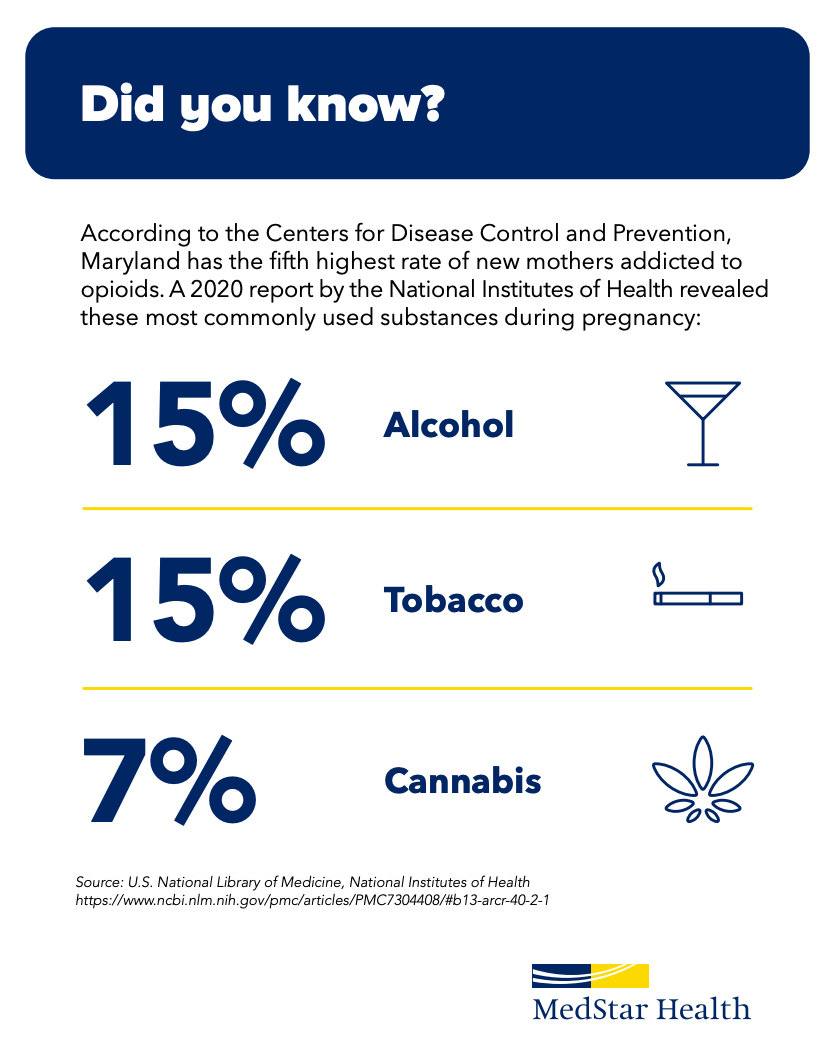Pictured above, Lakeitha Gross, a peer recovery coach meets with a patient at MedStar Franklin Square Medical Center.
At first glance, many of us wouldn’t know if an expectant mother is also quietly battling alcohol or substance addiction. But Lakeitha Gross would.
She knows a lot about the long road to recovery from substance use—because she’s traveled it. And now, as a peer recovery coach at MedStar Franklin Square Medical Center she is helping expectant and new mothers get the help and ongoing support they need to seek treatment, stay clean, and live healthier lives for themselves and their children.
“I’ve walked the walk, so I know firsthand what they’re dealing with. And I know it’s not easy,” says Gross, who at one time had a peer recovery coach herself. “I tell them about my own experience, let them know they are not alone and that I’m here to help.”
And that help begins with a simple screening at the patient’s routine Ob/Gyn appointment.
As the sole peer recovery coach in our Department of Ob/Gyn and Women’s Health Services at MedStar Franklin Square Medical Center, Gross’s role is a key part of the department’s Screening, Brief Intervention, and Referral to Treatment (SBIRT) program.
Launched in the Ob/Gyn department in April 2019, the SBIRT program is designed to identify those expectant and new mothers who are facing extreme challenges at home and connect them with the resources they need. These challenges include anything from housing and transportation needs to food insecurity and legal struggles.
“Most of the time, substance use is a result of things like trauma, depression, unhealthy living situations, and other circumstances that can make life so hard,” says Gross. “But normally, these things wouldn’t even be discussed at a regular Ob/Gyn appointment. So we would have no way of knowing someone needs help.”
Since implementing the SBIRT program, nurses and patient care technicians now ask every obstetrics patient the same series of screening questions regarding frequency of alcohol consumption, history of drug use, mental health concerns, living situation, domestic violence, and other issues vital to a patient’s overall well-being. If a patient’s answers reflect a need for additional followup, that’s where Gross comes in.
Find care now
If you are experiencing a medical emergency, please call 911 or seek care at an emergency room.
She recalls a particular patient who at first seemed hesitant to answer such questions out of fear of being judged. But once Gross began to share her own journey with the patient, she not only opened up, she cried and let Gross know that she was ready to seek help for substance abuse.
“I let her know she was right where she was supposed to be,” says Gross, who helped the 26-year-old pregnant patient obtain admission to outpatient drug treatment, and called her every day for weeks to support her along the way. And every time the patient came in for her monthly Ob/Gyn appointment, Gross was right there—even after the patient delivered her baby.
“Consistency is the key to gaining my patients’ trust and keeping it,” says Gross, adding that out of an average of 460 patients seen by the department in a given month, about 25% are referred to her for follow-up support. “We all need someone we can talk to and put our trust in.”














